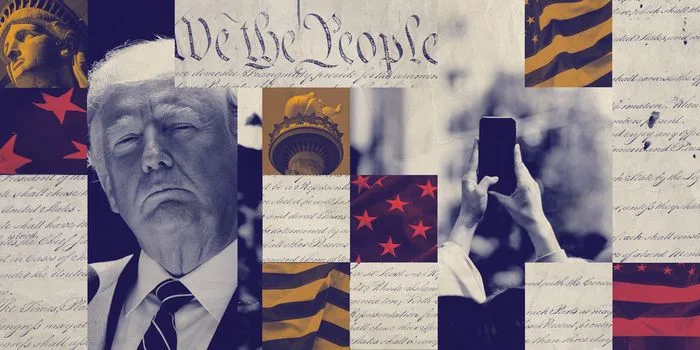By Stephen Zogopoulos, USNN World News
The premise
America is in another season of nonstop protest, lawfare, and institutional trench warfare. Since President Donald J. Trump returned to the White House on January 20, 2025, core planks of his second-term agenda—immigration enforcement, public safety, and executive control of the federal city—have been met by rapid-response demonstrations, national “weeks of action,” and a blizzard of lawsuits. Wikipedia
This column asks three questions:
- What are the administration’s key efforts that triggered resistance?
- Which protests met them, and who helped organize or resource those protests?
- Which judges have issued rulings constraining the agenda—and on what grounds?
I. The administration’s headline efforts (2025)
- Hard-line immigration and public-safety push. The White House and DOJ moved to surge federal presence in Washington, D.C., and to toughen deportation tools nationwide. One marquee gambit—invoking the 1798 Alien Enemies Act (AEA) to deport certain Venezuelan nationals allegedly tied to transnational crime—became a legal test case. A Fifth Circuit panel blocked the AEA use in a 2–1 ruling, saying mass unauthorized migration and gang activity don’t meet the statute’s “armed invasion/predatory incursion” threshold. The Wall Street JournalThe Daily Beast
- Expanded federal control in D.C. The administration’s “crime crackdown” in the capital brought increased federal agents and coordination with local police—moves that triggered neighborhood-level confrontations and broader street opposition. AP NewsPBS
II. The protests that followed (selected 2025 snapshots)
- Labor Day “Workers Over Billionaires” week of action (nationwide). Nearly 1,000 protests were slated across all 50 states, led by labor unions and advocacy partners (AFL-CIO, Public Citizen, MoveOn), explicitly opposing Trump-era labor and economic policies. The Guardian
- D.C. “No Kings”/anti-crackdown actions. Through late August and Labor Day weekend, D.C. organizations staged marches, runs, and nightly gatherings challenging federal control of local policing and immigration enforcement. Groups cited in coverage include Free D.C. and youth-climate allies; named organizers included Nee Nee Taylor of Harriet’s Wildest Dreams/Free D.C. AxiosFox News
- Neighborhood flashpoints. A Mount Pleasant standoff following a warrant operation near a school became a symbol of local pushback to federalized public-safety tactics. AP News
Are protesters “paid”?
The phrase is tossed around constantly—but proof matters. There is a documented commercial industry capable of hiring demonstrators (e.g., Crowds on Demand, 2018 LA Times reporting), yet many viral “got paid to protest” claims have been debunked (e.g., a 2025 video framed as satire; longstanding FactCheck.org analyses). The constitutional bottom line from recent scholarship: even paid protesting—when it occurs—remains protected First Amendment activity, though it can fuel cynicism. Los Angeles TimesReutersFactCheck.orgSSRN
III. Following the money: nonprofits, networks, and who funds whom
Open Society Foundations (OSF) and aligned grantmakers.
- OSF reports multi-billion-dollar lifetime giving and 1.7B in expenditures in 2023 across democracy, rights, and civil-society causes (U.S. and global). OSF explicitly funds U.S. groups that “strengthen civil society” and advocacy; its public materials describe how it awards grants and invites searches of its grantmaking. Open Society Foundations+2Open Society Foundations+2
- Claimed links to D.C. protest organizers. Media and watchdog write-ups in August 2025 asserted that groups helping organize anti-crackdown actions (e.g., Community Change and Community Change Action) received sizable support in 2023 from OSF and other progressive intermediaries (Arabella-linked entities, Tides). These reports cite tax filings reviewed by Americans for Public Trust. Caveat: these are secondary reports; readers should examine underlying 990s. New York PostVOZ
- Arabella Advisors–managed nonprofit network. InfluenceWatch describes the “Seven Sisters” (New Venture Fund, Sixteen Thirty Fund, Hopewell, Windward, North, Telescope, Impetus) as major pass-throughs for left-of-center advocacy; Arabella’s own materials frame its work as philanthropic services and fiscal sponsorship. (Descriptions vary by source.) InfluenceWatchArabella Advisors
- Political finance snapshots. OpenSecrets tracks OSF political disbursements and dark-money grant flows where identifiable; however, not all protest-movement funding is reported or traceable, and program grants to 501(c)(3)s are not the same as paying protesters. Distinguish general operating grants from direct protest expenditures. OpenSecrets+1
Bottom line: There is clear, publicly disclosed funding from major progressive philanthropies to organizations that also engage in advocacy, mobilization, and protest logistics. That does not—by itself—prove that individual protesters are remunerated for attendance, nor that funders “command” specific street actions. Readers should scrutinize filings (Forms 990), grant purpose language, and event-level expense records before drawing hard conclusions. Open Society Foundations+1
IV. Judges and rulings that have constrained the Trump agenda
2025 immigration/public-safety:
- Judge Leslie Southwick (5th Cir.) and Judge Irma Carrillo Ramirez (5th Cir.) — Majority blocking AEA mass-deportation use; Judge Andrew Oldham dissented. The Wall Street JournalThe Daily Beast
Broader pattern of judicial checks on Trump administrations (2017–2025):
- Compilations by Lawfare and Newsweek catalog dozens of rulings where federal judges thwarted or narrowed Trump-era policies across immigration, asylum, national security, and agency rulemaking. Examples in those lists include Amy Berman Jackson, Paul Engelmayer, Royce Lamberth, Loren AliKhan, John Coughenour, among others. Trackers emphasize volume and issue-area diversity rather than ideology alone. (Names come from curated lists; always verify the specific case and holding.) DefaultNewsweek
Climate and safety note: Reuters reported that several judges who ruled against the administration later faced threats—an unacceptable trend regardless of politics. Robust disagreement belongs in briefs and ballots, not in intimidation. Reuters
V. What it adds up to (Opinion)
- Policy friction was predictable; the scale is new. When a presidency centralizes on border, crime, and executive muscle in the capital, you’re going to get street mobilization + courtroom mobilization. 2025 has both, at national scale.
- Follow the filings, not the hashtags. There’s a world of difference between (A) philanthropies funding advocacy organizations and (B) compensating individual protesters. The first is documented; the second is frequently alleged, sometimes true in limited contexts, and often overstated online. Treat every viral claim with receipts-required skepticism. Los Angeles TimesReutersFactCheck.org
- Courts will keep shaping outcomes. The AEA defeat shows the judiciary is not rubber-stamping emergency-style immigration tools. Expect more injunction-ping-pong and a short path to the Supreme Court on separation-of-powers and statutory-authority fights. The Wall Street Journal
Quick reference lists
A) 2025 efforts drawing intense pushback
- AEA-based deportation strategy (blocked, pending appeals). The Wall Street Journal
- Federal law-enforcement surge and coordination in D.C. (ongoing). PBS
B) Notable 2025 protests
- “Workers Over Billionaires” Labor Day week (AFL-CIO, Public Citizen, MoveOn plus partners). The Guardian
- D.C. “No Kings”/anti-crackdown mobilizations (Free D.C., allied groups). Axios
- Mount Pleasant community confrontation after warrant operation. AP News
C) Funding ecosystems frequently linked to protest-oriented groups
- Open Society Foundations (large-scale grants to democracy/rights orgs; U.S. portfolio). Open Society Foundations+1
- Arabella-managed nonprofit network (e.g., Sixteen Thirty Fund, New Venture Fund). InfluenceWatch
- Reports on Community Change/Action receiving OSF and other grants (review underlying filings). New York PostVOZ
- OpenSecrets trackers for identifiable nonprofit-to-nonprofit grants and political disbursements. OpenSecrets+1
D) Judges & decisions (illustrative, not exhaustive)
- Leslie Southwick, Irma Carrillo Ramirez — 5th Cir. majority vs. AEA deportations; Andrew Oldham dissent. The Wall Street Journal
- Prior-era judges frequently noted in trackers: Amy Berman Jackson, Paul Engelmayer, Royce Lamberth, Loren AliKhan, John Coughenour, etc. (See curated lists for case specifics.) DefaultNewsweek
Disclaimer (Read before sharing)
- This is a clearly labeled opinion column.
- Allegations about “paid protesters” are often contested. Where specific funding relationships are mentioned, they are based on public reporting and watchdog summaries; readers should consult original IRS Form 990s/grant records for confirmation of amounts, dates, and purposes. General support grants to advocacy nonprofits do not prove payment to individual demonstrators or command/control of specific events. SSRNFactCheck.org
- Judicial references summarize public rulings or compilations; always review the opinions for holdings and context. The Wall Street JournalDefault
Stephen Zogopoulos is the founder of USNN World News. The views expressed here are his own and do not necessarily reflect those of USNN’s advertisers or affiliates.






